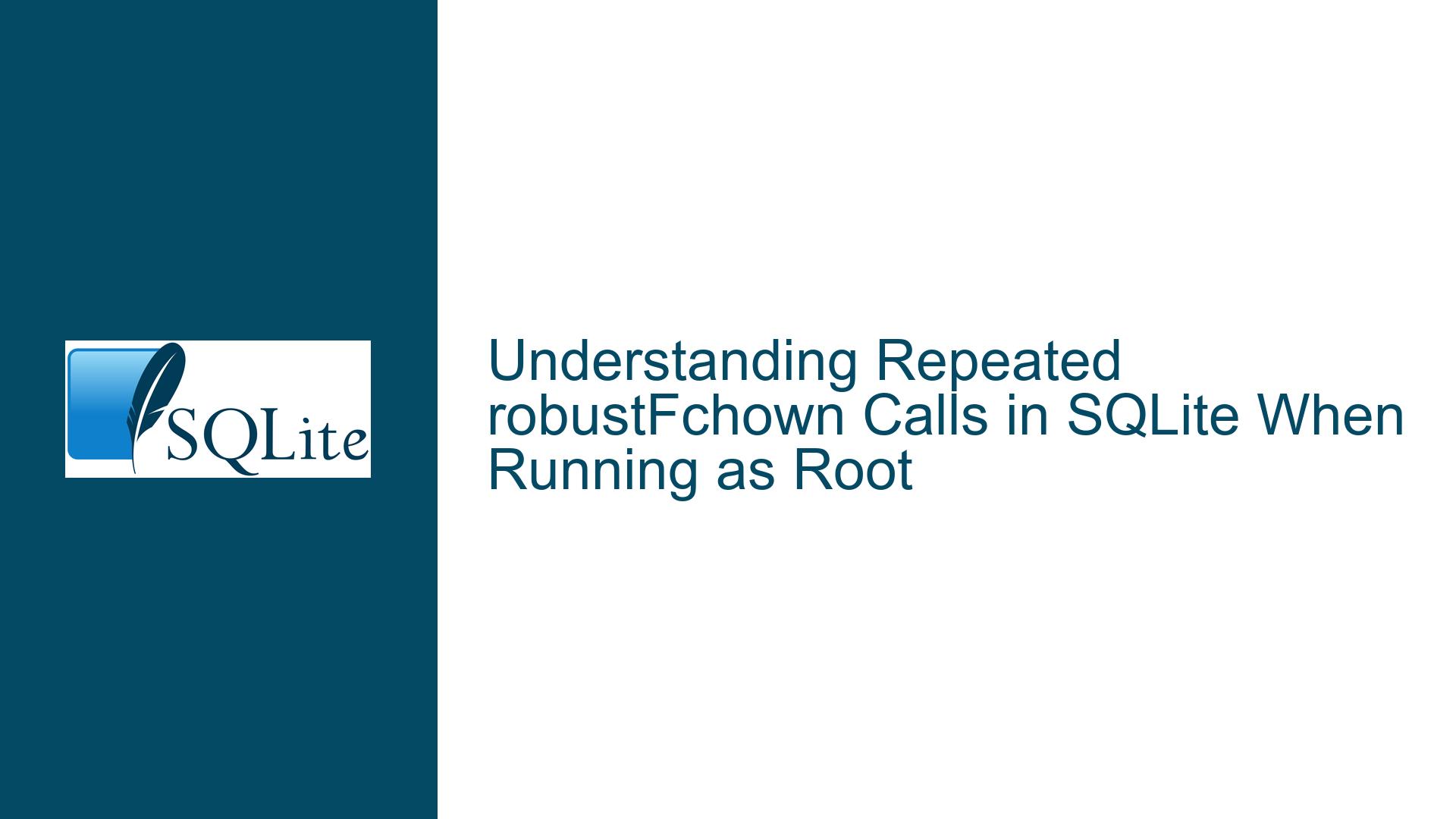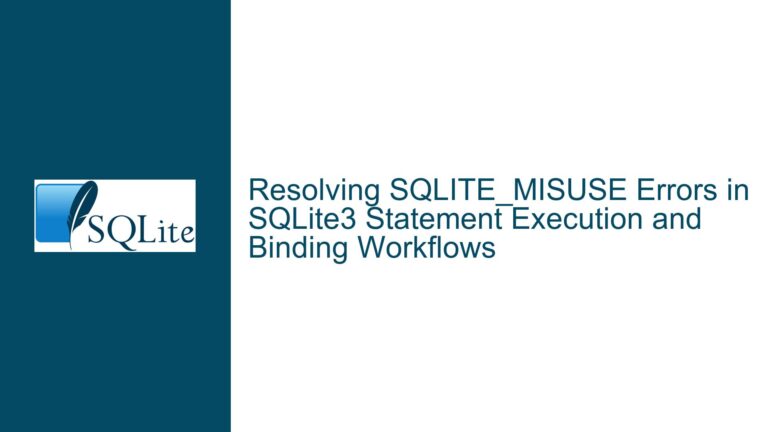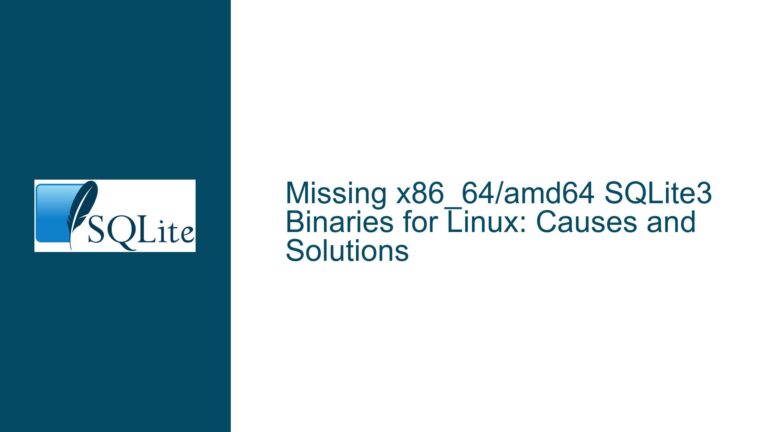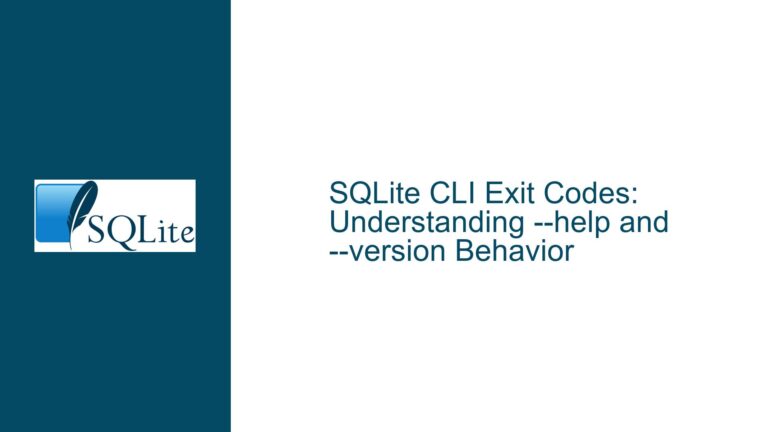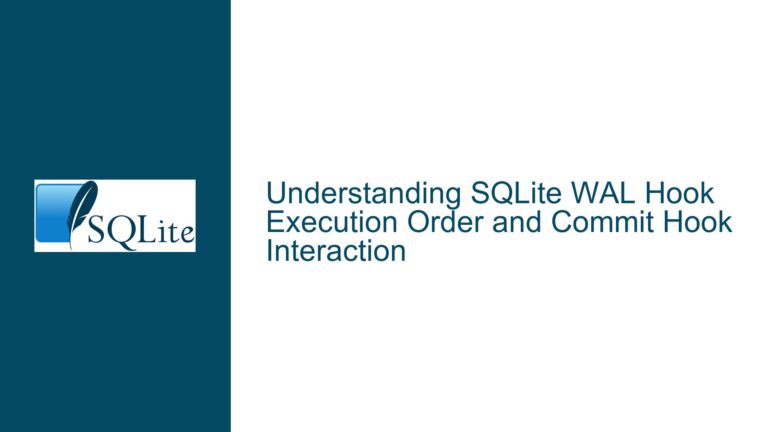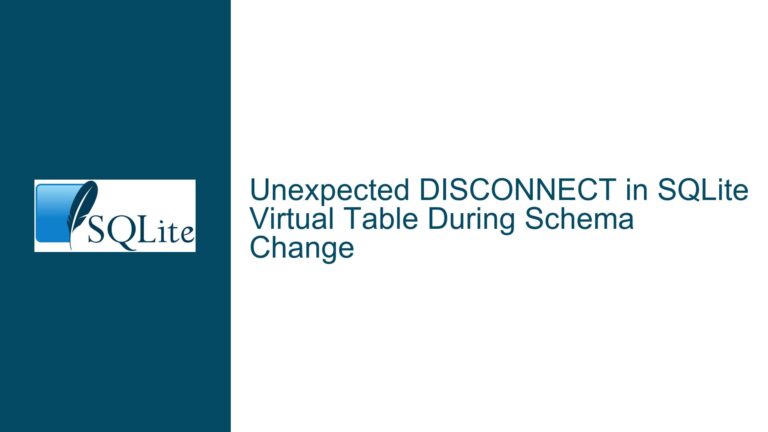Repeated robustFchown Calls in SQLite When Running as Root
Root-Triggered robustFchown Behavior and System Call Redundancy
Mechanism of robustFchown in SQLite’s File Ownership Management
The robustFchown function in SQLite is a specialized utility designed to handle file ownership changes in a resilient manner, particularly when the process operates with elevated privileges (e.g., as the root user). Its primary purpose is to ensure that database files and associated artifacts (e.g., journals, WAL files) maintain correct ownership metadata, even in edge cases where transient system errors or race conditions might disrupt these settings.
When SQLite runs as root, it assumes responsibility for aligning file ownership with the effective user or group that initially opened the database. This is critical in multi-user environments where a privileged process creates or modifies files that must later be accessible to non-privileged users. The robustFchown function wraps the fchown system call, adding retry logic to handle scenarios where the kernel returns EINTR (interrupted system call) or EAGAIN/EWOULDBLOCK (temporary resource unavailability). However, the forum discussion highlights an anomaly: repeated invocations of robustFchown on the same file descriptor (fd) without intermediate close() operations, leading to unexpected latency under heavy system load.
The function’s redundancy is tied to SQLite’s transactional guarantees. For example, during a write transaction, SQLite may open a journal file, write data, and repeatedly assert ownership to preempt scenarios where concurrent processes or external tools alter file metadata. While this approach enhances robustness, it introduces overhead when ownership assertions occur more frequently than necessary. The core issue arises when these repeated calls become a bottleneck, particularly on systems with high I/O contention or slow filesystems.
Root Causes of Redundant robustFchown Invocations
Three primary factors contribute to unnecessary robustFchown calls on the same file descriptor:
Stateless Ownership Checks in Multi-Operation Workflows
SQLite’s file management layer does not cache ownership metadata for open file descriptors. Every operation that modifies the file (e.g., committing a transaction, updating the write-ahead log) triggers a fresh ownership check viarobustFchown, even if the file descriptor remains open and no external ownership changes have occurred. This stateless design ensures correctness at the expense of efficiency, as each check involves a system call.Retry Loops for Transient Kernel Responses
TherobustFchownfunction retriesfchownindefinitely when the kernel returnsEINTR, a signal interruption error. In high-load environments, frequent signal delivery (e.g., from background processes or profiling tools) can force multiple retries, causing the function to stall. While this ensures eventual success, it exacerbates latency when the system is already under stress.File Descriptor Reuse Across Sessions
SQLite’s file descriptor cache (the "unix-excl" VFS) may retain and reuse file descriptors for frequently accessed databases. If a single descriptor is reused across multiple transactions, each transaction invokesrobustFchownanew, unaware that the ownership was already validated during a prior operation. This is common in long-lived processes handling numerous short transactions.
Mitigating robustFchown Overhead in High-Load Scenarios
To resolve latency caused by redundant robustFchown calls, consider the following strategies:
1. Implement Ownership Metadata Caching
Modify SQLite’s file-handling logic to track ownership metadata for open file descriptors. For example, extend the unixFile structure to include fields like uid and gid, populated during the first robustFchown call. Subsequent operations can skip fchown if the cached values match the current process’s effective UID/GID. This requires careful synchronization to handle cases where the file is reopened or the process’s credentials change mid-session.
2. Conditional Invocation Based on File State
Use fstat to retrieve the current ownership metadata before invoking robustFchown. If the existing UID/GID already match the desired values, bypass the fchown call entirely. While this adds an extra fstat system call, it is cheaper than redundant fchown operations in most cases. For example:
struct stat st;
if (fstat(fd, &st) == 0) {
if (st.st_uid != desired_uid || st.st_gid != desired_gid) {
robustFchown(fd, desired_uid, desired_gid);
}
}
3. Limit Retry Attempts for Kernel Errors
Introduce a cap on the number of EINTR retries in robustFchown. For instance, retry up to three times before returning an error. This prevents indefinite looping while still accommodating brief interruptions. Adjust the retry limit via a compile-time macro for customization across deployments.
4. Disable Ownership Management Where Redundant
If the application guarantees that file ownership will not change externally (e.g., databases in a tightly controlled environment), compile SQLite with -DSQLITE_DISABLE_FCHOWN to exclude robustFchown logic entirely. This is a trade-off, sacrificing robustness for performance.
5. Adopt a Lazy Ownership Update Strategy
Defer robustFchown calls until the file descriptor is closed or the process is about to relinquish control of the file. This batches multiple ownership changes into a single operation, reducing system call frequency. However, this approach risks missing ownership updates if the process crashes before the deferred call executes.
6. Profile and Optimize Contending Workloads
Use tools like strace, ftrace, or perf to identify code paths that trigger excessive robustFchown calls. For example, if journal file handling is the primary culprit, consider increasing the journal size or adjusting the journal_mode to reduce file creation/teardown cycles. Additionally, ensure the system’s pthread library and I/O scheduler are tuned for low-latency operations.
By addressing the interplay between SQLite’s ownership management logic and the system’s runtime constraints, developers can eliminate redundant robustFchown invocations while preserving the integrity of file metadata. The optimal solution depends on the specific deployment environment, balancing robustness requirements against performance objectives.
